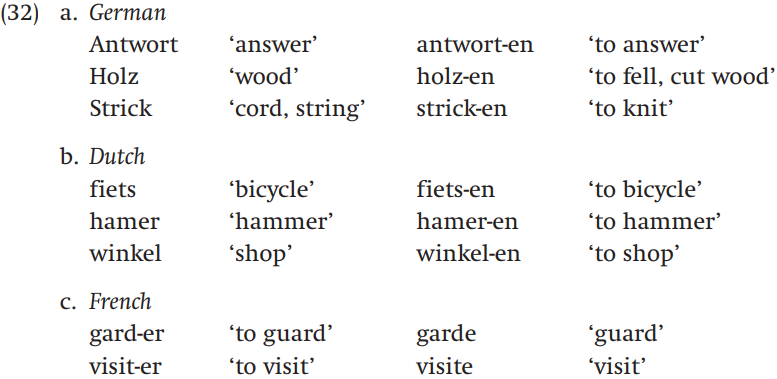


 Grammar
Grammar
 Tenses
Tenses
 Present
Present
 Past
Past
 Future
Future
 Parts Of Speech
Parts Of Speech
 Nouns
Nouns
 Verbs
Verbs
 Adverbs
Adverbs
 Adjectives
Adjectives
 Pronouns
Pronouns
 Pre Position
Pre Position
 Preposition by function
Preposition by function 
 Preposition by construction
Preposition by construction
 Conjunctions
Conjunctions
 Interjections
Interjections
 Grammar Rules
Grammar Rules
 Linguistics
Linguistics
 Semantics
Semantics
 Pragmatics
Pragmatics
 Reading Comprehension
Reading Comprehension|
Read More
Date: 21-1-2022
Date: 2023-10-10
Date: 2023-11-23
|
Conversion
Although we often form new lexemes by affixation or compounding, in English it is also possible to form new lexemes merely by shifting the category or part of speech of an already existing lexeme without adding an affix. This means of word formation is often referred to as conversion or functional shift. In English, we often create new verbs from nouns, as the examples in (31a) show, but we also do the reverse (31b), and sometimes we can even create new verbs from adjectives (31c):

When we create new verbs from nouns, the resulting verbs may have a wide range of meanings. For example, to bread is ‘to put bread (crumbs) on something’, but to fish is ‘to take fish from a body of water’. And to clown is ‘to act like a clown’ rather than to put a clown somewhere or take a clown from somewhere! Going in the opposite direction, the meaning of the new word is usually more predictable; that is, when we turn a verb into a noun, the result usually means something like ‘an instance of X-ing’, where X is the denotation of the verb. So for example, a throw is ‘an instance of throwing’.
English is, of course, not the only language with conversion. Noun to verb conversion occurs frequently in German and Dutch as well, as the examples in (32a–b) show, and verb to noun conversion is said to occur in French, as the examples in (32c) show:

There may appear to be a suffix added in the derivation of the verbs in the examples in (32a–b) and one deleted in (32c). But the -en suffix in German and Dutch and the -er suffix in French do not derive the verbs per se – they are inflectional morphemes that signal the infinitive form of the verb. If we assume that conversion involves only the base or root, these examples count as conversion.
|
|
|
|
التوتر والسرطان.. علماء يحذرون من "صلة خطيرة"
|
|
|
|
|
|
|
مرآة السيارة: مدى دقة عكسها للصورة الصحيحة
|
|
|
|
|
|
|
نحو شراكة وطنية متكاملة.. الأمين العام للعتبة الحسينية يبحث مع وكيل وزارة الخارجية آفاق التعاون المؤسسي
|
|
|